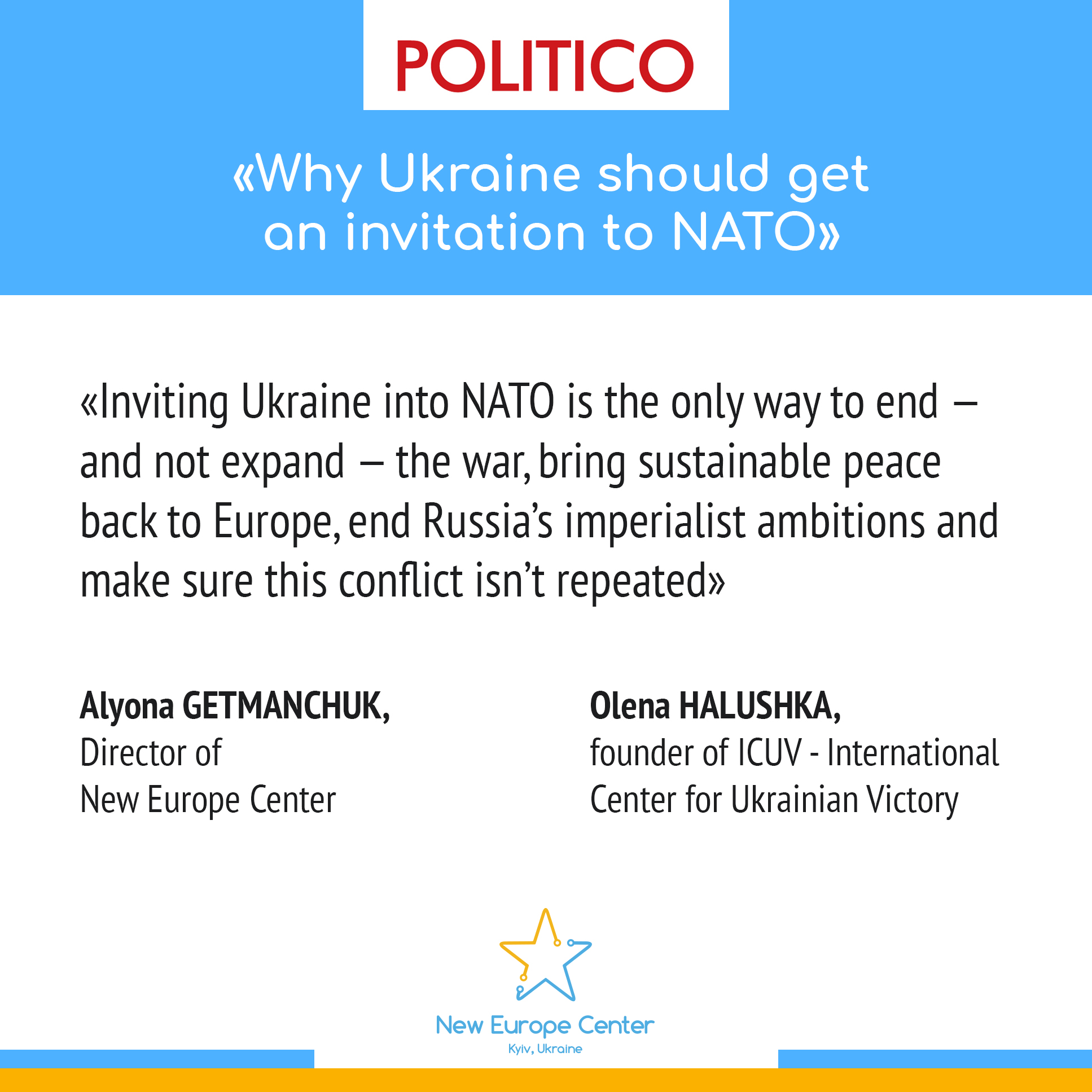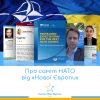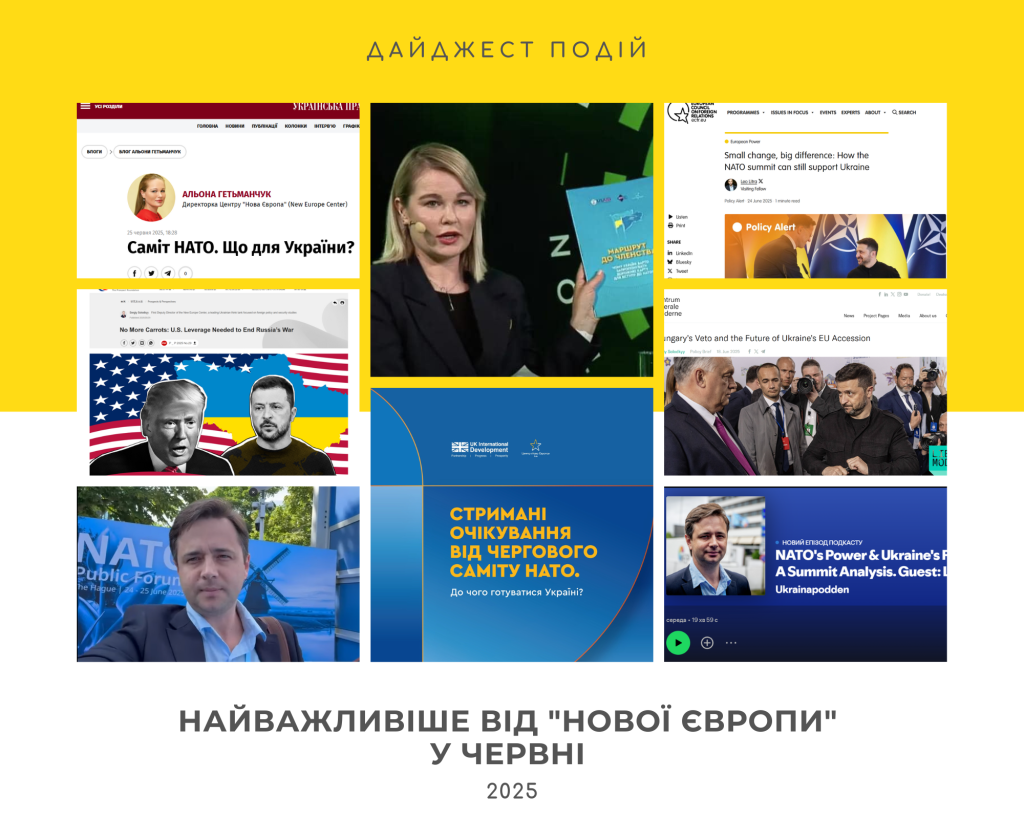
For decades, NATO’s policy toward Ukraine was driven by the desire to avoid “provoking” Russian President Vladimir Putin at any cost. And, unfortunately, it appears the invasion of Georgia in 2008 and of Ukraine in 2014 didn’t teach NATO member countries the lesson that it is concessions — and not strength — that provoke Russia.
The upcoming NATO Summit in Vilnius has a historic mission to fix the strategic mistakes of the 1994 Budapest Memorandum and NATO’s 2008 Bucharest Summit. It is a chance to introduce effective security guarantees for Ukraine — which voluntarily gave up the world’s third-largest nuclear arsenal — and effectively end the era of so-called strategic ambiguity that has allowed Russia de facto veto power over the accession of various countries to NATO, giving hope to the idea that the great Russian empire can be restored in the 21st century.
In 2008, Ukraine was promised that one day it would become a NATO member, but in the following 15 years, no clear steps toward integration have taken place. And it is now high time to stop treating the country as a burden for transatlantic security and make good on that commitment.
The truth is, Ukraine is an asset. For over 15 months, the country’s armed forces have been repelling an invasion by the so-called second-largest army in the world, and shielding NATO from “the most significant direct threat.” Prior to that, Ukraine also contributed to all major NATO-led missions and operations — including Iraq and Afghanistan, where it impressed the world with its evacuation of Canada-bound Afghans from Kabul during the withdrawal of troops. And when the world was hit by COVID-19, Ukraine’s cargo planes delivered emergency medical supplies to Allies through NATO’s strategic airlift program.
Meanwhile, the argument that the NATO enlargement process can’t start during wartime is only incentivizing Putin to prolong the sluggish fighting. Plus, it is a myth that NATO is limited in its ability to invite countries in the middle of war. In reality, there’s actually no clear list of criteria, nor are there any formal restrictions regarding wartime. Rather, according to the 1995 study on NATO enlargement, the decision to invite a particular country is made on a case-by-case basis. And though all previous accessions were, indeed, held in the absence of active war, the lack of such experience doesn’t mean it’s prohibited.
Many also fear that inviting Ukraine to join the Alliance at the Vilnius Summit would mean NATO soldiers marching into Ukraine to fight the Russian army early next morning. But it’s enough to simply take a look at the official NATO accession procedure to understand that’s absolutely not the case.
Article 5 applies only to full members, and getting full membership is preceded by a complex procedure that took Finland a full year and Sweden is still in the middle of. So, by the time Ukraine actually became a NATO member, it would have had many opportunities to regain control over its territory. Moreover, NATO has experience accepting countries that have occupied territories — like Germany. West Germany was at the forefront of the Cold War in Europe when it joined the Alliance in 1955, while East Germany remained under Soviet occupation and joined with the reunification of Germany in 1990.
Additionally, according to research we conducted at the New Europe Center, which tracks Ukraine’s implementation of NATO principles and standards, in 2021 the country had already implemented more standards than some current NATO members. Ukraine is also rapidly transitioning to modern weapons in combat, and its soldiers are mastering NATO’s weapons faster than expected. The battlefield has become a testing ground for weapons like Patriot air defense systems, as Ukraine’s troops proved they can intercept Russia’s hypersonic ballistic missiles.
Despite the significant progress made in interoperability, however, there are still issues to be addressed. U.S. President Joe Biden recently reminded that Ukraine still has to “clean up corruption.” Between between 2014 and 2022, Ukraine actually achieved a lot in combating corruption and establishing rule of law, and while not all of the changes have been fully implemented yet, the country continues reforming even in wartime — though at a slower pace — with its anti-corruption fight receiving a powerful boost from the EU candidate status and the attached conditionalities. Granting Ukraine an invitation to NATO and starting the negotiating process would similarly give its defense and security reforms a huge push as well. With record-high support for NATO membership from 82 percent of Ukrainians, accession talks would strengthen the country’s resilience, but in areas not covered by EU accession, such as democratic oversight of Ukraine’s security and defense sector, state secrecy or improvement of defense procurements.
Many NATO country leaders would probably be surprised to learn their own citizens view the prospect of Ukraine’s NATO accession much more favorably than they do. A poll conducted by Kantar on behalf of the New Europe Center revealed that among participants, 70 percent of Americans, 55 percent of the Dutch, 53 percent of Italians, 56 percent of the French and 50 percent of Germans support the idea of a NATO extending an invitation to Ukraine as early as the Vilnius Summit. And the number of respondents who outright opposed an invitation was strikingly low.
As a union of democracies, the Alliance needs to heed the voice of its citizens.
The role that NATO membership would play in terms of the sustainability of peace in the mid- and long-term, as well as in reconstruction efforts, shouldn’t be underestimated either. Throughout the year, donors have convened several conferences focusing on Ukraine’s reconstruction and ways to attract foreign investors, but many investors considering participating in Ukraine’s reconstruction are asking about security. Inviting Ukraine to join NATO would be a much cheaper and more sustainable guarantee for them than launching multi-billion insurance funds, or covering swaths of Ukrainian territory with air defense systems.
NATO accession would also be a powerful signal to millions of Ukrainian refugees — particularly families with children who don’t want their sons and daughters to fight in the next hot phase of the war. NATO accession would show them they can safely return to Ukraine and plan their future lives at home.
Furthermore, not inviting Ukraine to join NATO bears several geopolitical and practical risks. It means Russia will retain its de facto veto right over NATO enlargement — a confirmation that its policy of waging wars and occupying other countries works. Alliance countries will also be sending a signal to the Kremlin that they view Ukraine’s NATO membership as a bargaining chip in possible future negotiations, ignoring the agency of the Ukrainian people and discrediting the Alliance in the eyes of not just Ukrainian society but their own citizens who support the country’s invitation too.
Ukraine is also a democracy with the largest combat-experienced army in Europe. And while having it within the Alliance would turn it into a powerful asset for NATO, keeping it out, in the “gray zone,” might pose a risk.
Overall, the Russian army would have no chance in a military confrontation with NATO — it is barely coping with the Armed Forces of Ukraine. Thus, inviting Ukraine into NATO is the only way to end — and not expand — the war, bring sustainable peace back to Europe, end Russia’s imperialist ambitions and make sure this conflict isn’t repeated once Russia rearms and trains its new conscripts.
This is a time of historic challenges that require historic leadership, and the West mustn’t be afraid — Ukrainians are not.
The original article is on Politico – https://www.politico.eu/article/why-ukraine-should-get-an-invitation-to-nato/







